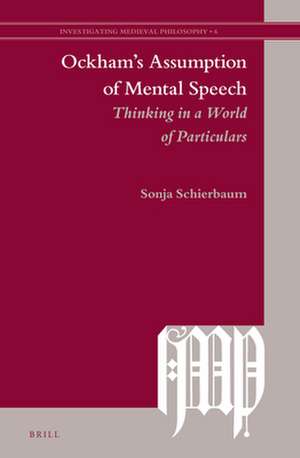Ockham's Assumption of Mental Speech: Thinking in a World of Particulars: Investigating Medieval Philosophy, cartea 6
Autor Sonja Schierbaumen Limba Engleză Hardback – 26 iun 2014
Din seria Investigating Medieval Philosophy
- 18%
 Preț: 794.14 lei
Preț: 794.14 lei - 23%
 Preț: 961.81 lei
Preț: 961.81 lei - 18%
 Preț: 730.87 lei
Preț: 730.87 lei - 18%
 Preț: 840.93 lei
Preț: 840.93 lei - 18%
 Preț: 725.54 lei
Preț: 725.54 lei - 18%
 Preț: 762.88 lei
Preț: 762.88 lei - 18%
 Preț: 672.33 lei
Preț: 672.33 lei - 18%
 Preț: 764.05 lei
Preț: 764.05 lei - 18%
 Preț: 699.42 lei
Preț: 699.42 lei - 18%
 Preț: 625.25 lei
Preț: 625.25 lei - 18%
 Preț: 812.55 lei
Preț: 812.55 lei - 18%
 Preț: 939.68 lei
Preț: 939.68 lei - 18%
 Preț: 1037.81 lei
Preț: 1037.81 lei - 18%
 Preț: 610.67 lei
Preț: 610.67 lei - 18%
 Preț: 780.71 lei
Preț: 780.71 lei
Preț: 716.04 lei
Preț vechi: 873.22 lei
-18% Nou
Puncte Express: 1074
Preț estimativ în valută:
137.03€ • 142.53$ • 113.13£
137.03€ • 142.53$ • 113.13£
Carte indisponibilă temporar
Doresc să fiu notificat când acest titlu va fi disponibil:
Se trimite...
Preluare comenzi: 021 569.72.76
Specificații
ISBN-13: 9789004277342
ISBN-10: 900427734X
Pagini: 268
Dimensiuni: 155 x 235 x 20 mm
Greutate: 0.57 kg
Ediția:New.
Editura: Brill
Colecția Brill
Seria Investigating Medieval Philosophy
ISBN-10: 900427734X
Pagini: 268
Dimensiuni: 155 x 235 x 20 mm
Greutate: 0.57 kg
Ediția:New.
Editura: Brill
Colecția Brill
Seria Investigating Medieval Philosophy
Cuprins
Acknowledgements ...vii
Abbreviations ...viii
Introduction...1
1 The Basic Characteristics of Language: Signification and Supposition...12
1.1 Introduction...12
1.2 Signification and Supposition of Terms: First Approximation...14
1.3 Absolute vs. Connotative Terms...21
1.4 The Narrow and the Wider Sense of ‘Signify’ (significare)...24
1.5 The Property of Supposition ...37
1.5.1 The ‘Standard’ Case: (Personal) Supposition and the Truth and Falsity of Affirmative Propositions ...47
1.5.2 Personal Supposition of Terms and ‘Taking a Term Significatively’ (Sumi Significative) ...55
1.5.3 Improper Use and Improper Supposition ...64
1.5.4 Simple and Material Supposition ...70
1.6 Summary ...78
2 Ockham’s Semantic Model: Subordination, Correspondence, and the Role of Mental Speech with Respect to Spoken Language ...80
2.1 Introduction ...80
2.2 Signification in Relation to Subordination and Imposition ...82
2.3 Conventional Signification and Equivocation ...93
2.4 Mental Propositions and Spoken Propositions: The Relation of Correspondence...102
2.4.1 The General Explanation of ‘Truth’ and ‘Falsity’...111
2.4.2 Correspondence: Synonymy Again...123
2.4.3 Correspondence: Equivocation Again...129
2.5 Demonstratives, Correspondence, and Supposition of Mental Terms...134
2.6 Summary...143
3 Ockham’s Model of Thought...146
3.1 Introduction...146
3.2 How to Acquire an Absolute Simple Concept...152
3.2.1 The Three Steps of Concept Acquisition...155
3.2.2 Some Objections...171
3.3 Ockham’s Model of Non-Propositional and Propositional Acts...174
3.3.1 Propositional Acts of Apprehension: Mental Propositions...178
3.3.2 Propositional Acts of Apprehension: Spoken Propositions...185
3.3.3 Acts of Judgement...190
3.3.3.1 The First Kind of Assent...194
3.3.3.2 The Second Kind of Assent...199
3.4 Intuitive Cognition and Evident Judgement...203
3.4.1 General Propositions and Evident Judgement: propositiones per se notae...215
3.5 Summary...228
4 Why Ockham Is Not Fodor...231
4.1 Behaviourism vs. Cognitive Science...233
4.2 Fodor on Language Acquisition...236
4.3 Fodor’s Language of Thought (lot)...240
4.4 Fodor on Mental States and Acts...242
4.5 Why Ockham Is Not Fodor (Summary)...249
5 Conclusion...251
Literature...257
Index...264
Abbreviations ...viii
Introduction...1
1 The Basic Characteristics of Language: Signification and Supposition...12
1.1 Introduction...12
1.2 Signification and Supposition of Terms: First Approximation...14
1.3 Absolute vs. Connotative Terms...21
1.4 The Narrow and the Wider Sense of ‘Signify’ (significare)...24
1.5 The Property of Supposition ...37
1.5.1 The ‘Standard’ Case: (Personal) Supposition and the Truth and Falsity of Affirmative Propositions ...47
1.5.2 Personal Supposition of Terms and ‘Taking a Term Significatively’ (Sumi Significative) ...55
1.5.3 Improper Use and Improper Supposition ...64
1.5.4 Simple and Material Supposition ...70
1.6 Summary ...78
2 Ockham’s Semantic Model: Subordination, Correspondence, and the Role of Mental Speech with Respect to Spoken Language ...80
2.1 Introduction ...80
2.2 Signification in Relation to Subordination and Imposition ...82
2.3 Conventional Signification and Equivocation ...93
2.4 Mental Propositions and Spoken Propositions: The Relation of Correspondence...102
2.4.1 The General Explanation of ‘Truth’ and ‘Falsity’...111
2.4.2 Correspondence: Synonymy Again...123
2.4.3 Correspondence: Equivocation Again...129
2.5 Demonstratives, Correspondence, and Supposition of Mental Terms...134
2.6 Summary...143
3 Ockham’s Model of Thought...146
3.1 Introduction...146
3.2 How to Acquire an Absolute Simple Concept...152
3.2.1 The Three Steps of Concept Acquisition...155
3.2.2 Some Objections...171
3.3 Ockham’s Model of Non-Propositional and Propositional Acts...174
3.3.1 Propositional Acts of Apprehension: Mental Propositions...178
3.3.2 Propositional Acts of Apprehension: Spoken Propositions...185
3.3.3 Acts of Judgement...190
3.3.3.1 The First Kind of Assent...194
3.3.3.2 The Second Kind of Assent...199
3.4 Intuitive Cognition and Evident Judgement...203
3.4.1 General Propositions and Evident Judgement: propositiones per se notae...215
3.5 Summary...228
4 Why Ockham Is Not Fodor...231
4.1 Behaviourism vs. Cognitive Science...233
4.2 Fodor on Language Acquisition...236
4.3 Fodor’s Language of Thought (lot)...240
4.4 Fodor on Mental States and Acts...242
4.5 Why Ockham Is Not Fodor (Summary)...249
5 Conclusion...251
Literature...257
Index...264
Notă biografică
Sonja Schierbaum, Ph.D. (2012), University of Hamburg, is a postdoctoral researcher at the Humboldt-University, Berlin. She has published several articles in journals such as Vivarium. She co- authored a volume on the medieval conception of self-knowledge with Dominik Perler.
